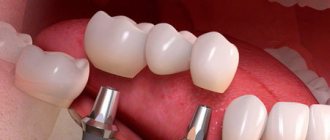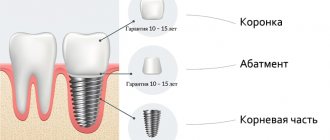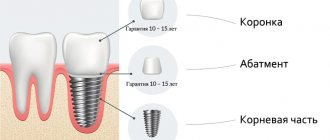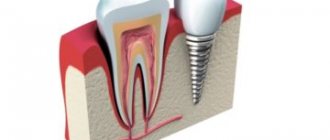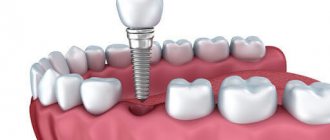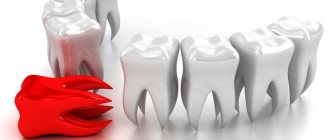When to place a dental implant
Indications for implant installation are:
- Defect of one tooth (implantation will protect neighboring ones from destruction).
- Loss of several units. To fulfill its functional load, the dentition needs restoration.
- End defects of the dentition. The implant is able to replace any unit of the row, unlike most other prostheses, the installation of which requires support in the form of an adjacent tooth.
- Completely edentulous. If removable dentures are not suitable for the patient for some reason, implantation is an alternative.
Who is implantation indicated and contraindicated for?
It is recommended for older people in cases where other methods of dental restoration do not give the desired result. Indications for the procedure:
- complete edentia (absence of all teeth);
- single defects of the dentition (including terminal ones);
- injuries to deep areas of the gums and tooth roots;
- non-occlusion or increased abrasion of teeth;
- severe destruction of the coronal part;
- previous diseases of soft tissues, after which tooth extraction is required;
- impossibility of performing removable prosthetics.
Before implantation, consultation with a doctor is required.
The success of implantation depends on the patient's health status . Before surgery, a comprehensive diagnosis is required. Age itself cannot be a reason to refuse the procedure. Contraindications that apply to people of all age categories:
- mental disorders;
- immune system disorders;
- sexually transmitted diseases and cancer;
- tuberculosis or diabetes mellitus;
- bone diseases;
- inflammation of the oral mucosa;
- diseases of the circulatory system;
- bruxism;
- endocrine diseases;
- intolerance to anesthetics.
Some contraindications are relative; after they are eliminated, it is possible to perform surgery:
- arthrosis-arthritis of the temporomandibular joint;
- atrophy of the alveolar process;
- inflammation of the gums or periodontitis;
- general somatic diseases in the acute stage;
- period after radiation therapy;
- caries or tartar;
- pathological bite;
- inflammatory processes in the bone in the area of implantation;
- prolonged stress;
- alcoholism, drug addiction, smoking;
- taking medications that reduce blood clotting;
- cachexia (depletion of the body);
- insufficient oral hygiene
Smokers need to quit cigarettes 10-12 days before surgery.
In case of metabolic or hormonal system dysfunction, implant rejection is possible. If these diseases are detected, it is better to choose another method of restoring the dentition.
At what age is implantation performed?
Dentists recommend implantation starting at the age of 25. Theoretically, it is possible to implant an implant from the age of 17 for girls and from the age of 18-19 for boys - after the final formation of the bone tissue of the dentofacial apparatus. Placing an implant at an earlier age can lead to malocclusion.
There is no age limit in implantology. Age “over 60” is not a contraindication to dental implantation, therefore, in the absence of other obstacles, implantation is quite possible.
In what cases is it not recommended to do so?
Implantation is not possible if you have the following diseases:
- cardiac;
- endocrine (diabetes mellitus, etc.);
- diseases of the nervous systems;
- psychical deviations;
- oncological;
- renal failure;
- immune pathologies;
- hemophilia;
- allergies to painkillers;
- drug addiction and alcoholism.
Implantation is not performed until the growth of the facial skeleton is complete (childhood and adolescence).
After eliminating the above points, the procedure is performed according to the classical scheme
. There are problems that temporarily limit the possibility of the operation:
- lack of bone - extension is carried out;
- endocrine diseases;
- presence of other implants;
- frequent stress;
- nutritional deficiencies;
- taking antidepressants;
- venereal diseases.
Contraindications to the installation of implants are defects and damage in the patient’s oral cavity, which are eliminated by the dentist at the stage of preparation for implantation:
- bruxism (teeth grinding);
- excessive grinding of crowns;
- malocclusion;
- jaw defects;
- caries;
- poor oral hygiene.
Why should it not be used for children and adolescents?
To understand why it is impossible to install an implant in a child or teenager, it is enough to simulate the situation and imagine what changes will occur in the growing body after implantation: as the facial skeleton grows, the natural material will move, but the artificial one will remain in place, gradually ending up in the thickness of the bone.
This is due to the peculiarities of connection with the bone of a natural tooth and a tooth-replacement structure. In the first case, it is a living biological complex capable of changing the structure: tooth-ligament-bone. Thanks to this property, orthodontic treatment is possible. In the case of an implant, osseointegration occurs - biochemical fusion of bone and rod without connecting components, so the artificial root does not have even minimal mobility .
Once bone formation is complete, the patient's age does not affect the operation. An orthodontist will help determine the timing of completion of growth of the facial skeleton.
Dentist recommendations!
Dental prosthetics in children has its own specifics, associated not only with the design features of the prostheses, but also has a psychological side. To make it easier for your child to experience the complex process of prosthetics, use the following recommendations from a specialist:
- before deciding to install a particular prosthesis, make sure that the most complete examination has been carried out and an accurate diagnosis has been established;
- Form the habit of your child regularly visiting the dentist for preventive examinations, and not only when treatment is required;
- behave confidently, do not show anxiety or fear. Young children sense their mother’s mood well and adopt it;
- Schedule a visit to the doctor at a time when your child is sleepy, rested and well-fed.
Currently, more and more parents are convinced of the need for preventive and therapeutic dental prosthetics in children. The full development of the dental-jaw system of children under 6 years of age guarantees the health and harmonious development of the body throughout life.
Detailed patient review about basal implantation at the Smile-at-Once clinic
Cause of caries in children
Many children's baby teeth begin to rot at a young age. The most important reason is that tooth enamel is affected by organic acids, which, as a result of the breakdown of carbohydrates, enter the oral cavity with food. There are also a number of other factors:
- poor oral hygiene;
- pathology and defects in the structure of the dental cavity (irregularities and crevices accumulate food debris, which leads to the appearance of microbes in the mouth);
- maternal health problems during pregnancy;
- infectious and viral diseases;
- artificial nutrition of the child;
- often smoking;
- lack of balanced nutrition;
- genetic predisposition.
You need to understand that the rudiments of permanent dental units are located under the milk teeth, which means that the milk teeth need to be radiated, otherwise, in the place of the milk patient, a patient and permanent one will then grow.
Dental implantation – a possibility of salvation or not?
The Bio Oss dental implant is a manufactured structure that is used for installation into the bone tissue of the jaws and its subsequent implantation.
This product replaces the roots of previously lost or completely destroyed units, which will help restore the entire row in the future. And now about the most important thing: dental implants are strictly contraindicated for children. The bottom line is that they can only be installed from the moment of adulthood, when the bone tissue in the facial skeleton is already fully formed. There is no upper “ceiling” for installation age unless there are contraindications.
What are the features of implantation in diabetes?
Thanks to the achievements of modern dentistry, a diagnosis such as diabetes is no longer a direct contraindication to implantation. Its negative effect is longer engraftment time and frequent development of inflammation.
Therefore, before the procedure, the patient undergoes preparation, and if diabetes is well controlled - the sugar level remains normal during the treatment received, then the wound healing process will proceed without any problems. The main thing is to follow medical recommendations and maintain oral hygiene.
How do implants take root in older people?
If no complications arise immediately after the operation, then the implantation of the artificial root proceeds in a standard manner. During the recovery period, it is necessary to follow the doctor’s recommendations and also avoid placing heavy loads on the implant. Elderly patients have to visit the clinic more often than others for preventive examinations. In general, there are not many absolute contraindications to dental implantation for older people. The doctor will tell you about all the possibilities of prosthetics at your first free appointment at the Empire dental clinic.
Is bone augmentation required?
In most cases, if possible, the dentists of our clinic try to choose a more gentle and rapid express treatment method in order to avoid bone buildup due to atrophy. However, if the procedure is unavoidable, we perform it on older patients for the same reasons as others.
Low bone height, thinning in width - due to these problems, placement of an implant may not be possible. This is especially critical for the upper jaw. The alveolar ridge is extremely susceptible to atrophy, and already 2.5-3 months after tooth loss, the bone begins to dissolve in this place.
If such a problem exists, the dentist may offer the patient a closed or open sinus lift. A closed one is preferable - it is more gentle and bloodless. When performing it, you do not need to wait until the bone tissue is formed. You can immediately install the implant, and osseointegration - fusion with the bone - will occur as the bone tissue matures.
We also note that if it is possible to use a modern method and do without bone augmentation, AcademStom dentists try to recommend this treatment protocol to the patient. Extension prolongs the duration of therapy and delays the final result - permanent fixed prosthetics.
What implantation methods are recommended for older patients?
In gerontological practice (when treating older patients), our AcademStom dentistry more often uses methods that reduce the burden on the body. We are talking about simultaneous implantation with immediate loading:
- Immediate Load procedure with immediate donning of a loaded prosthesis. There are several varieties of it that allow you to replace lost teeth (All-on-4 or All-on-6 protocol).
This technique has several advantages over others. It does not require bone augmentation, because the implant can be installed at an angle to avoid areas with atrophy.
It is worth noting that when using the Immediate Load technique, implantation occurs in a more gentle way. There is no need to drill into the bone and injure the tissue. It is enough to make a small puncture and carefully screw a titanium rod through it into the bone.
Prosthetics on these implants is carried out immediately (within 1-7 days after surgery). For people who have worn dentures for years or been completely toothless, having teeth that resemble their own means a lot. They are aesthetic and in no way similar to artificial ones.
In some cases, with permanent prosthetics, a special type of prosthesis may be chosen - with artificial gum. When using it, no additional work is required to install the gum former. Teeth will look aesthetically pleasing even with existing tissue deficiency caused by shrinkage due to atrophy. They can be easily touched up and adjusted later directly in the oral cavity.
Dental implantation in childhood
Dentists note that recently the number of requests for implants in children has increased significantly. This is due to early tooth loss due to traumatic removal due to a fall or impact. Another group of young patients suffers from caries and gum disease, which affect the condition of the enamel and destroy crowns.
Doctors clearly state that dental implantation in childhood is extremely undesirable and contraindicated for a number of reasons:
- The jaw is not fully formed until the age of 18. Like the rest of the bones of the skeleton, it “grows” in proportion to the body. If implantation is performed on a child, gaps and holes may gradually appear between the crowns.
- The structure of bone tissue responds to the level of the hormone in the human blood. In adolescents, the peak of such fluctuations occurs at 13–16 years of age, and greatly affects all systems and internal organs.
- A number of children naturally have an incorrect bite, have a diastema or other anomalies. Until the age of 16–18 years, they can be eliminated with the help of braces and other simple techniques. Therefore, implantation can only slow down the natural process.
In addition, the procedure for implanting a metal pin into the jaw bone resembles a real operation and requires the use of anesthesia. It is painful and unpleasant even for an adult, so it can negatively affect the child’s general well-being and immunity.
DETAILS: Express dental implantation – what are the more pros and cons?
If you lose your front teeth, your dentist will often suggest a temporary restoration instead of implantation. It is made of plastic or other lightweight material and is discreetly attached to the interdental spaces. As the baby grows, it is replaced with a new one, which looks more proportional and natural. This allows you to get rid of discomfort when communicating with peers for the next few years.
Another group of patients – people over 50 years old – also requires increased attention when using prosthetics using a similar method. For them, installing implants is often the only opportunity to regain comfort when eating food and taste delicious foods again. Most pensioners have a hard time getting used to removable jaws and bridges and deny themselves active communication for fear of being embarrassed when communicating or visiting.
When installing implants in people over 60 years of age, it is necessary to carry out more thorough preparation, collect maximum medical history and apply an in-depth examination of the entire body. What matters to the specialist is the state of the cardiac system, blood pressure, and how the patient will tolerate anesthesia when the pin is implanted. Dental implantation in old age is complicated in the following situations:
- Osteoporosis often begins in women over 45–50 years of age. The disease makes the bones more fragile and pliable, which can lead to subsidence of the prosthesis and its premature deterioration.
- Some medications contain components that can increase the risk of rod rejection or provoke an allergic reaction. Before surgery, the dosage of thinning thrombolytics is adjusted to avoid dangerous blockage of blood vessels or severe bleeding.
- Diabetes, hypertension and other chronic health problems often negatively impact the healing process. In this situation, it is better to choose a different type of prosthesis.
For implantation to be successful in adulthood, it is necessary to conduct a computer examination. Weakened and sagging areas of the bone are strengthened with special plates, and soft tissue is augmented. If the upper jaw is very thin, sinus surgery is recommended. Sometimes a course of physiotherapy and professional cleaning of interdental spaces is carried out.
Older patients should pay more attention to the cleanliness of their gums in the first few weeks after screwing in the pin. They more often experience candidiasis and stomatitis due to reduced immunity, healing and growth of bone tissue on the metal axis is worse. It is necessary to wear a temporary prosthesis, which distributes the load on healthy teeth until the main crown is installed. At home, patients rinse with antiseptics several times a day and follow a light diet for a long time.
The best period for installing artificial dentures on pins is the age of patients from 20 to 60 years. By this time, young people have completely gone through puberty, and hormone levels reach constant levels. The bite has formed and all defects become obvious. Young people are rarely diagnosed with chronic diseases; bone tissue tends to recover quickly.
DETAILS: CLASSIC DENTAL IMPLANTATION OR IMPLANTATION WITH INSTANT LOAD?
Dental implantation at a young age carries minimal risks of material rejection. The rod grows into the periodontium faster, so less time is required for each stage. But even in this group of patients there are a number of serious contraindications that cause refusal:
- diseases that disrupt or slow down the growth of epithelial tissues (rheumatism, scleroderma);
- insulin-dependent diabetes;
- serious problems with the nervous system;
- epilepsy;
- disturbances in the rate of blood clotting;
- oncological tumors;
- hypertonicity of the facial muscles.
Dentists refuse young girls and women whose weight is below normal, those who abuse mono-diets and strict nutrition without vitamins. It is not recommended to place an implant during periods of nervous stress, depression or travel to a country with a different climate.
In most cases, what matters to an orthodontist is not the patient’s age limit, but the ability of his bone tissue to regenerate and hold the pin in a given position. Smoking, poor nutrition and irregular dental care often bring many problems to a young person, worsening the condition of the oral cavity and gums, leading to implant rejection even though the doctor’s work is quite high-quality.
First of all, it is worth saying that there are no upper age restrictions for implantation - there are restrictions only for adolescents and young people under the age of 16-18, which is due to the peculiarities of skeletal formation. Can older people get dental implants? Of course, it is possible, but only if the general condition of the patient’s body and his level of health allow this type of operation to be performed. Therefore, before deciding on the possibility of implantation, the patient must undergo a diagnostic examination.
With age, the ability to regenerate tissue decreases, and any intervention is less tolerated by the body, and the recovery period becomes longer. In addition, some endocrine and cardiovascular diseases contribute to fairly rapid bone atrophy. A competent implantologist must take all these features into account in his work and select prosthetic methods that are optimal for a particular patient.
In modern dentistry, there are several different types of implants, which differ in design and have different indications for use. For implantation, older patients are usually recommended:
- Basal implantation with immediate load. It is usually used to replace multiple defects in the dentition or in cases of complete edentia. Implants are installed in the deep (basal) layer of bone, which ensures reliable and high-quality fixation even if its volume is insufficient.
- Mini implants. Due to their small size, such structures are installed minimally invasively and the healing time is noticeably reduced. However, mini-implants can only support removable prosthetic structures; due to their small size, they are not designed for heavy loads.
- Classical implantation is recommended in cases where the patient is ready to wait for the implants to fully engraft, or when it is possible to carry out one-stage implantation immediately after tooth extraction.
DETAILS: Painkillers after dental implantation
Classic two-phase implantation is not suitable for all mature patients, since it requires high bone density. The increased trauma of the method can lead to complications and prolonged tissue healing.
Types of methods:
- Single-stage implantation. It is performed immediately after tooth extraction if there is sufficient bone volume.
- Mini-implantation. Thin and small implants are used, which are installed through a small puncture in the gum. Any bone condition is suitable for the method. Often used to install removable dentures.
- Installation of pin with momentary load. Immediately after installation of the implant, prosthetics with an artificial crown are performed.
Dental floss, a single-tuft brush or a brush will help you reach remote areas. Cleaning is carried out at least 2 times a day, then the mouth is rinsed with an antiseptic solution or irrigated with an irrigator.
To increase the life of the implant, you need to carefully monitor oral hygiene. You can use a regular or electric toothbrush to brush your teeth.
It is recommended to use special toothpastes to care for implants, which prevent pigmentation and gently clean artificial structures.
Is implantation possible for cardiovascular diseases? If yes, what are its features?
Implants are not performed in people who have recently had a heart attack. In other cases, for people with heart and vascular diseases, our dentists always try to find an alternative method for easier and gentler implantation.
In fact, the presence of problems with the cardiovascular system does not in any way affect the survival rate of the implant. Simply an increased level of stress (fear, worries) can negatively affect overall well-being, placing additional stress on cardiac activity.
The presence of hypertension may also be important. Increased pressure during the procedure can lead to bleeding. Therefore, preparatory therapy is prescribed to heart patients - sedatives and hypotensive (pressure-reducing) drugs.
Absolute and relative contraindications
Restrictions on implantation are classified into conditional, absolute, temporary and local. Let us consider in more detail the types of contraindications.
Absolute, when implantation is impossible:
- diseases of the cardiovascular system;
- diseases of the central and peripheral nervous systems;
- disturbances in the functioning of the endocrine system (decompensated diabetes mellitus, hypothyroidism);
- malignant neoplasms, metastases;
- systemic connective tissue diseases;
- diseases of the circulatory system (impaired hematopoiesis, poor clotting);
- renal and liver failure;
- mental disorders (dementia, schizophrenia, paranoia);
- treatment with anticoagulants, immunosuppressants and cytostatics;
- autoimmune diseases (lupus erythematosus, multiple sclerosis, rheumatoid arthritis);
- age up to 25 years.
Relative, when there is a high risk of rejection:
- bad habits (alcoholism, smoking, drug addiction);
- exhaustion of the body;
- venereal diseases;
- HIV, AIDS in the acute phase (immunopathological changes are observed);
- compensated diabetes mellitus;
- the presence of other metal prostheses in the body;
- passion for extreme sports.
Is dental implantation possible in older patients? If so, what should you prepare for?
Implantation in adults is possible at almost any age. If a patient comes to our clinic whose age is over 55 years old, we know that we need to make more efforts to get results:
- You will have to come for appointments more often . The doctor will more carefully monitor the progress of engraftment to prevent the development of inflammation and implant rejection.
- A thorough examination will be required . It is especially important that permission for the procedure is given by the therapist observing the person. The presence of diabetes and hypertension is not a strict contraindication for a number of implantation techniques.
- You will need to undergo psychological training . A high level of stress is overcome by prescribing light sedative (calming) drugs and a heart-to-heart conversation, during which the doctor will dispel the patient’s doubts and fears.
The specialists of our AcademStom clinic have successful experience in treating older patients, and we try to help everyone who comes to us.
Dental implantation in old age
Elderly patients require no less attention than children and adolescents. Many people over 50 have dental problems. Often, implantation is the only way to restore lost teeth, thereby increasing the quality of life.
If health allows, implantation can be performed in old age
Many patients find it difficult to get used to removable dentures, and the condition of the remaining teeth does not allow them to install bridge structures. In this case, dental implantation comes to the rescue.
Dentists do not have a clear answer to the question: up to what age can dental implantation be performed? Theoretically, it is possible at any age.
If an elderly patient is in good health, eats normally, has no bad habits, and takes good care of his teeth, then he can be given implants. With proper care and regular visits to the doctor, they will last for the rest of your life. Doctors in many dental clinics have experience working with patients over 60 and even 70 years old who have successfully implanted dental implants.
Of course, in old age you need to approach this procedure more carefully. The doctor must collect a complete medical history and conduct an examination of the patient’s entire body. Before performing an operation, it is important to examine not only the tissues of the oral cavity, but also to assess the condition of the heart, blood vessels, and circulatory system. The body of an elderly person tolerates anesthesia less well, so its choice must be approached very responsibly.
The most common complications in older patients are:
- After 45 years, many women develop osteoporosis. This is a disease in which bones become brittle and brittle. With this disease, there is a risk of the pin sagging or falling out
- Some medications can cause implant rejection or cause an allergic reaction, so you need to select medications very carefully. Before surgery, the doctor adjusts the dose of blood thinning thrombolytics to protect the patient from sudden blockage of blood vessels or severe bleeding
- Elderly people often suffer from diseases such as diabetes, hypertension, etc. They negatively affect the implant healing process. Therefore, dentists recommend that such patients not take risks and give preference to another method of dental restoration.
To carry out a successful operation, it is necessary to conduct a computer examination.
If the patient has weakened or sagging areas of the jawbone, they need to be strengthened with special plates or soft tissue augmented. If the volume of the upper jaw bone is insufficient, a sinus lift is indicated. In some cases, a course of physiotherapy or professional teeth cleaning is required.
Following the doctor’s recommendations after implantation is an indispensable condition for good survival and long service life of implants.
After surgery, patients must carefully follow all doctor's recommendations and keep their teeth and gums clean. The fact is that as people age, due to weakened immunity, candidiasis and stomatitis occur more often, and the metal pin grows worse with the bone tissue. To properly distribute the load, it is necessary to wear a temporary prosthesis until the implant has completely fused with the bone tissue.
To care for the oral cavity, it is recommended to rinse your mouth with antiseptic solutions. In addition, it is important to follow a gentle diet, avoiding hard, sticky and viscous foods.
Why is it contraindicated?
In children and adolescents, as could already be understood earlier, at this age there is a gradual formation of bone tissue, but disturbing its structure is strictly contraindicated, because in the future this can lead to irreversible consequences.
When the prosthetist places into the wound, i.e. A specially prepared denture bed is pressed there with instruments, plus the same pressure is exerted by the children's implant itself on the bone. For an adult, this situation is normal, because the metal part of the structure will be secured much better. When performing such an operation on minor children, the still unformed tissue will be injured, and the recovery process will be disrupted.
It is interesting that the growth of the skeleton in the human body is completed only by the age of 20-25 - it all depends on the individual structure of the person. But the maxillofacial part is formed in a completely different way, at a different, slower pace
What are the features of implantation for osteoporosis?
This disease often affects women in menopause. Hormonal changes in the body do not go unnoticed, and some people develop osteoporosis due to calcium loss. These are areas where the bone ceases to be hard and becomes loose. An implant cannot be implanted in such a place, since there will be no primary stabilization. Bone augmentation will improve bone tissue performance.
The doctor may also suggest an implantation method designed to bypass the problem area. It is worth noting that implant prosthetics have a good effect on the general condition of the bone in osteoporosis. Destructive processes stop against the background of improved blood circulation, and new lesions do not appear.
Age as a contraindication to the installation of dental implants
One of the key contraindications to dental implantation is age. Until the formation of the dental system and bone tissue is completely completed, the operation remains prohibited. This usually happens between the ages of 17 and 22. But there is no upper age threshold for implantation: it all depends on the general condition of the patient.
Many patients are interested in how the implantation of artificial roots will affect their future life and whether they will encounter contraindications after dental implantation.
So, for the first 2 - 3 months, until the implants stabilize, you will have to avoid active physical activity, hypothermia and overheating (visits to baths and saunas, hardening). But after the implantation of the artificial root, there will be no restrictions in the patient’s lifestyle.
There is a common myth that dental implants are a contraindication for MRI. Indeed, you should not be in a tomograph with metal objects on your body, but titanium, from which most implants are made, is paramagnetic and practically does not react to the action of a magnetic field.
The only problem that the patient may encounter is distortion of the image at the site of installation of artificial roots, so before the examination it is necessary to warn the doctor about their presence. Modern equipment allows you to change settings, partially eliminating the error. The implants do not affect the results of examination of other parts of the body.
Of course, it’s always worth keeping in mind what other patients write about the procedure: this will help you understand the intricacies and avoid any mistakes. However, it is much more important to responsibly choose a dental clinic and implantologist, and then strictly follow his recommendations. A competent specialist working with advanced implant systems will prevent complications from occurring.
We have discussed the main indications and contraindications for dental implantation. Your doctor will tell you more about them: he will answer all questions and draw up a list of restrictions that are relevant specifically for you.
| Type of implant | Dentistry Meliora Dent | Dentistry Dmitrovich and Colleagues | Dentistry Mendeleev | Dentistry ActiveStom |
| Nobel Biocare | From 45000 | From 40000 | From 47000 | From 50000 |
| M.I.S. | From 25000 | From 34300 | From 25000 | From 21000 |
| Alpha Bio | From 19900 | From 18000 | From 21000 | From 25000 |
| Astra Tech | From 55000 | From 35100 | From 44900 | From 46100 |
The main problems that interfere with the process of implantation or its stabilization in the bone are:
- Reduced immunity. Every year the state of the immune system worsens. Blood cells involved in the formation of immune factors lose activity and are produced by the body with reduced intensity.
- Problems with the blood coagulation system. Despite their presence, you can always choose a less traumatic treatment principle, for example, bloodless implantation.
- Impaired perception of anesthesia. During the procedure, you will have to carefully choose an anesthetic in order to numb the surgical field well.
- Areas of severe bone atrophy. In addition to osteoporosis, another specific problem of bone tissue is its atrophy. It develops gradually in place of lost teeth.
Older patients who come to us often have complete or partial edentia - the absence of teeth on one or both jaws. In this case, a suitable technique is selected to obtain prosthetics faster and without additional operations.
Implantation in adults is possible at almost any age. If a patient comes to our clinic whose age is over 55 years old, we know that we need to make more efforts to get results:
- You will have to come to the appointment more often. The doctor will more carefully monitor the progress of engraftment to prevent the development of inflammation and implant rejection.
- A thorough examination will be required. It is especially important that permission for the procedure is given by the therapist observing the person. The presence of diabetes and hypertension is not a strict contraindication for a number of implantation techniques.
- You will need to undergo psychological training. A high level of stress is overcome by prescribing light sedative (calming) drugs and a heart-to-heart conversation, during which the doctor will dispel the patient’s doubts and fears.
The specialists of our AcademStom clinic have successful experience in treating older patients, and we try to help everyone who comes to us.
Implantation is not contraindicated for people who have crossed the 60-year mark of their lives. On the contrary, successfully performed prosthetics on implants improves digestion, and therefore the nutrition of the body. Therefore, you should not suffer from functional disorders of the jaw apparatus.
When collecting patient data and during treatment, our doctors listen to all complaints in order to reduce the risk of failure during implantation. They care about the health of patients. Always polite, welcoming and trying to help.
Thanks to the achievements of modern dentistry, a diagnosis such as diabetes is no longer a direct contraindication to implantation. Its negative effect is longer engraftment time and frequent development of inflammation.
Therefore, before the procedure, the patient undergoes preparation, and if diabetes is well controlled - the sugar level remains normal during the treatment received, then the wound healing process will proceed without any problems. The main thing is to follow medical recommendations and maintain oral hygiene.
This disease often affects women in menopause. Hormonal changes in the body do not go unnoticed, and some people develop osteoporosis due to calcium loss. These are areas where the bone ceases to be hard and becomes loose. An implant cannot be implanted in such a place, since there will be no primary stabilization. Bone augmentation will improve bone tissue performance.
The doctor may also suggest an implantation method designed to bypass the problem area. It is worth noting that implant prosthetics have a good effect on the general condition of the bone in osteoporosis. Destructive processes stop against the background of improved blood circulation, and new lesions do not appear.
Implants are not performed in people who have recently had a heart attack. In other cases, for people with heart and vascular diseases, our dentists always try to find an alternative method for easier and gentler implantation.
In fact, the presence of problems with the cardiovascular system does not in any way affect the survival rate of the implant. Simply an increased level of stress (fear, worries) can negatively affect overall well-being, placing additional stress on cardiac activity.
The presence of hypertension may also be important. Increased pressure during the procedure can lead to bleeding. Therefore, preparatory therapy is prescribed to heart patients - sedatives and hypotensive (pressure-reducing) drugs.
In gerontological practice (when treating older patients), our AcademStom dentistry more often uses methods that reduce the burden on the body. We are talking about simultaneous implantation with immediate loading:
- Immediate Load procedure with immediate donning of a loaded prosthesis. There are several varieties of it that allow you to replace lost teeth (All-on-4 or All-on-6 protocol).
DETAILS: Complete dental implantation in the absence of teeth
This technique has several advantages over others. It does not require bone augmentation, because the implant can be installed at an angle to avoid areas with atrophy.
It is worth noting that when using the Immediate Load technique, implantation occurs in a more gentle way. There is no need to drill into the bone and injure the tissue. It is enough to make a small puncture and carefully screw a titanium rod through it into the bone.
Prosthetics on these implants is carried out immediately (within 1-7 days after surgery). For people who have worn dentures for years or been completely toothless, having teeth that resemble their own means a lot. They are aesthetic and in no way similar to artificial ones.
In some cases, with permanent prosthetics, a special type of prosthesis may be chosen - with artificial gum. When using it, no additional work is required to install the gum former. Teeth will look aesthetically pleasing even with existing tissue deficiency caused by shrinkage due to atrophy. They can be easily touched up and adjusted later directly in the oral cavity.
Implantation in old age, done using one of the low-traumatic techniques and following the requirements, usually proceeds without any problems. High survival rate allows it to be prescribed to people over 80 years of age. Thanks to timely treatment, you can restore missing teeth and stop wearing uncomfortable and unsightly dentures!
How many implants are needed depends on the number of teeth that need to be restored. If one tooth is lost, one implant is placed. If two or three molars are missing, then two or three dentures are placed, respectively. It is not advisable to limit yourself to one implant, since it may not withstand the increased load during chewing. In case of complete edentia, the number of dentures is determined by the doctor depending on the expected interdental distance.
Types of implantation:
- Intraosseous installation of dental implants is characterized by insertion of the prosthesis into the bone tissue. This technology is the most popular and in demand all over the world, since it has the least number of possible complications. The dental implant is installed directly into the bone bed.
- Basal implantation is indicated for bone deficiency and the absence of several consecutive teeth. Using this technique, implants are installed if it is impossible to build up bone tissue. But it is dangerous due to possible side effects and complications. In addition, structures made according to the basal type are not very reliable, so the basal installation of dentures occupies a modest place in modern implantology.
- Intramucosal technology is most often used in removable prosthetics for convenient and reliable fixation of false jaws. In this case, the implant is inserted directly into the gum.
